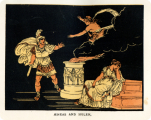
All studies and reports have been devoted the last fifteen years teaching languages and cultures of antiquity have been diagnosed with an accelerated decline of the classics that are common today that a Bachelor of twenty. Latin and Greek, and with them the knowledge of ancient Greek and Latin, become unknown lands. The teaching of ancient languages and the discovery of ancient cultures occupy a marginal now. The situation is however paradoxical humanities in our country as in most Western countries.
For as the school situation looks bleak, both Latin and Greek are marginalized and abandoned by the vast majority of students and families, as many experiences and best practices in higher education as evidenced in the cultural field the "social need" of the classics is a reality. A cultural reality for European companies still feel the heirs of Greco-Roman antiquity, a professional reality in a world where some companies are realizing the outstanding skills of young adults trained in the rigorous literary and linguistic knowledge of antiquity.
Training who have made a special place in the humanities can see their character recognized excellence through collaboration between businesses and universities original. This paper suggests ways to develop awareness and integration of classical culture in training, to show how the humanities fertilize academic learning European languages, how they remain the principle of our national and European culture, how Finally, they are precious in the rigorous training of young adults called upon to perform various jobs.
- Keywords: antique, classics, European culture, training, school humanities.
- Author: Jean-François Pradeau
- No. 2013-02, February 2013

